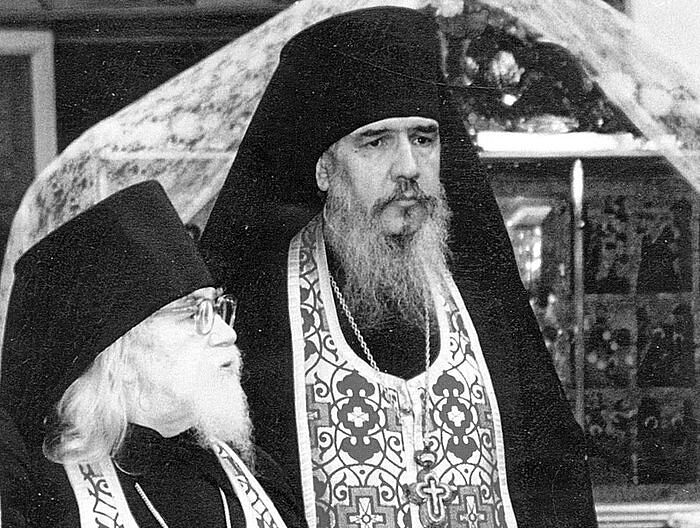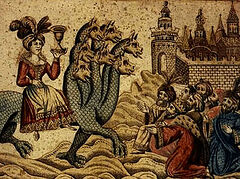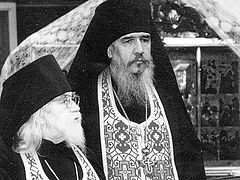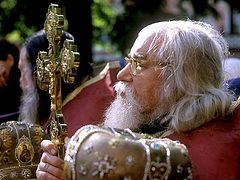Dear brothers and sisters, I congratulate you on the patronal feast of our holy monastery, the day of New Martyrs and Confessors of the Russian Church!
The saints call upon us to draw lessons from every liturgical text, from every Scripture reading that we can apply to our lives and carry out. In today’s epistle reading, we heard the following words of St. Paul: This is a faithful saying, and worthy of all acceptation, that Christ Jesus came into the world to save sinners; of whom I am chief (Tim. 1, 15). Howbeit for this cause I obtained mercy, that in me first Jesus Christ might shew forth all longsuffering, for a pattern to them which should hereafter believe on him to life everlasting (Tim. 1, 16).
The apostle Paul shows to us his great humility and God’s great love for mankind, because his confession by these words that he is the most sinful of all sinners, the most sinful of all people, is part of St. John Chrysostom’s prayer that we read before receiving Holy Communion, I believe, Lord, and I confess, that You are truly the Christ, the Son of the living God, Who came into the world to save sinners, of whom I am the first. And this state, when one feels he is the most sinful, is an indication of our humility.
The holy fathers wrote that spiritual health begins only when one sees that his sins are numerous as the sands of the sea. The apostle Paul says that he obtained mercy, but at the same time he recollects that he distressed and persecuted the Church; moreover, he savaged the Church, and for that reason he confessed he was a great sinner. But the Lord had mercy on him and gave him generous gifts. Having gone that significant way, the apostle Paul writes, Christ […] came into the world to save sinners, of whom I am the first. Having gone this remarkable spiritual way and having received many graced-filled gifts, St. Paul sees himself as the most sinful person. For this reason he reminds us: God showed all His great patience to me, and no one after me should despair of his salvation, because I, the greatest sinner of all sinners, received mercy. When a doctor gives different types of medicine to a severely ill person and cures him, he earns the trust of other people that turn to him.
Fr. John (Krestiankin) said that there are many people nowadays who have wallowed in various sins but who received an impetus from God for their salvation. And everyone should be fully aware of God’s mercy, for we were dead because of sin, but the Lord raised us from that death; we should be fully aware of God’s power, for with this power we will be able in the future to stand up against sin; we should realize our complete helplessness without God and our absolute power in God and with God.
Today we celebrate our patronal feast, the day of all the New Martyrs and Confessors of the Russian Church. Archimandrite John (Krestiankin), who spent years in camps and was a confessor of the Orthodox Faith, putting great trust in God both in the camps and everywhere, reposed on this day about fifteen [now seventeen] years ago. And today [February 4, 2021] reposed archimandrite Antony (Guliashvili), one of Fr. John’s most faithful disciples. He used to come to our church, was acquainted with our many parishioners and served here. This year would have marked fifty-five years of his priesthood. For the last forty years of Fr. John’s life, Fr. Antony was his spiritual son. He came to the Pskov-Caves Monastery for the first time, as he told us, with his mother. Fr. John singled them out from the crowd and said, “Come, come with me.” Fr. Antony’s mother strongly objected to her son one day becoming a priest, a monk. Fr. Antony had to go through many troubles—and his mother had to endure many trials—but he ultimately became a priest. At first, his mother was a convinced opponent of the Christian faith, but Fr. John told Fr. Antony at their first meeting that his mother would receive the monastic tonsure. He wondered, how can she receive the monastic tonsure if she is totally against his priesthood even now, when he is already a priest? Many years passed, but his mother was still not entirely positive towards the Church. Shortly before her death, however, she began to take Communion and then received the monastic tonsure. Fr. Antony personally tonsured her.
In around the year 2000, Fr. Antony fell seriously ill; he had a bad heart, high blood pressure and needed surgery. That surgery, shunt surgery after which people usually recover on the tenth day, was not entirely successful, he developed complications and was in intensive care for fifty-one days. He had been at our monastery and we sent him to the hospital. Emergency physicians called us to say that Fr. Antony would not survive, the complications were lethal, and nothing could be done. Metropolitan Tikhon (Shevkunov) telephoned Fr. John to tell him what happened. Fr. John said that Fr. Antony would not die, that we should go to the hospital and give him Communion. The brethren communed him on each of those fifty-one days when he was in intensive care. It was terrible to look at him—his entire chest and stomach were slashed, there were catheters and tubes sticking out from everywhere… And we doubted whether Fr. Antony would be able to survive. But having heard that Fr. John said those words, he deeply believed them, and he survived.
 We asked him, “Fr. Antony, how did you survive?”. He answered, “I firmly believed that I would survive, not the least because (as he loved to point out) I firmly believed the words of the Holy Scripture that the Lord has no pleasure in the death of the wicked, but that the wicked turn from his way and live (cf. Ez. 33, 11). And I believed I was a great sinner; therefore the Lord had no pleasure in my death but wanted me to live and bear fruits of repentance”. He repeated these words to us all the time.
We asked him, “Fr. Antony, how did you survive?”. He answered, “I firmly believed that I would survive, not the least because (as he loved to point out) I firmly believed the words of the Holy Scripture that the Lord has no pleasure in the death of the wicked, but that the wicked turn from his way and live (cf. Ez. 33, 11). And I believed I was a great sinner; therefore the Lord had no pleasure in my death but wanted me to live and bear fruits of repentance”. He repeated these words to us all the time.
Fr. Antony suffered from numerous illnesses to the last moment of his life. Once he went to a service and fell down on his way to church. As he said, he felt that “something snapped”. But he went to the service anyway, served the Liturgy, “I don’t know how, I could hardly hold the chalice”. Later the doctors examined him and said, “Batiushka, how could you serve? You have a clavicle fracture!” Fr. Antony underwent treatment, and thanks be to God, recovered. He always had portraits of Fr. John hanging over his bed. He had such typical gesture, “Don’t you see how difficult it is for me? Help me!” Till the last day of his life, Fr. Antony had the greatest hope in God and greatest trust in his spiritual father.
He firmly believed Fr. John’s every word. When Fr. John was dying, the doctors said, “Fr. Antony, will you go there? You can’t fly, you won’t survive it!” And he said, “No, I will go.” He did not just go, but flew in an airplane, arrived, came to Fr. John’s cell attendants and said, “I have come as I always come to see Fr. John every year and to get recharged with ‘fuel’ for the entire year, to regain spiritual strength and carry out my ministry for the entire year.” They said, “Batiushka is weak”. But he answered, “I will not leave until I recharge from him.” “He’s crazy,” they said, “let him go.” They let him see Fr. John; he stood by him for some time, received his blessing, wept, and left.
 Fr. John died several days later. Fr. Antony was already in Tbilisi, and he said, “I’m going back to Pechory.” The doctors said, “No, you can’t go, you won’t survive”. But he said, “I will go.” He arrived in Moscow, and it was extremely cold there. All the train tickets to Pechory had been sold out. What should he do? He called his spiritual children, and they drove him by car; they traveled via St. Petersburg. Suddenly the car stopped and could not go any further—it was too cold, and Fr. Antony prayed, “Batiushka, help, I have to say goodbye to you!” They repaired the car and were able to get to Pechory. Such was his loyalty to Fr. John, and he had such loyalty to his spiritual father till the last day of his life.
Fr. John died several days later. Fr. Antony was already in Tbilisi, and he said, “I’m going back to Pechory.” The doctors said, “No, you can’t go, you won’t survive”. But he said, “I will go.” He arrived in Moscow, and it was extremely cold there. All the train tickets to Pechory had been sold out. What should he do? He called his spiritual children, and they drove him by car; they traveled via St. Petersburg. Suddenly the car stopped and could not go any further—it was too cold, and Fr. Antony prayed, “Batiushka, help, I have to say goodbye to you!” They repaired the car and were able to get to Pechory. Such was his loyalty to Fr. John, and he had such loyalty to his spiritual father till the last day of his life.
Fr. John says in his letters, “Men of God are leaving for a different world, the world is becoming empty without these men of God, and life is getting harder. Always remember those precepts, those instructions that you saw in these men who testified with their life that they were men of God…”








